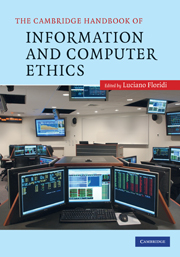Book contents
- Frontmatter
- Contents
- List of contributors
- Preface
- Acknowledgements
- Part I Introduction and background
- Part II Ethical approaches
- Part III Ethical issues in the information society
- 6 Social issues in computer ethics
- 7 Rights and computer ethics
- 8 Conflict, security and computer ethics
- 9 Personal values and computer ethics
- 10 Global information and computer ethics
- 11 Computer ethics and applied contexts
- Part IV Ethical issues in artificial contexts
- Part V Metaethics
- Epilogue: The ethics of the information society in a globalized world
- References
- Index
10 - Global information and computer ethics
Published online by Cambridge University Press: 05 June 2012
- Frontmatter
- Contents
- List of contributors
- Preface
- Acknowledgements
- Part I Introduction and background
- Part II Ethical approaches
- Part III Ethical issues in the information society
- 6 Social issues in computer ethics
- 7 Rights and computer ethics
- 8 Conflict, security and computer ethics
- 9 Personal values and computer ethics
- 10 Global information and computer ethics
- 11 Computer ethics and applied contexts
- Part IV Ethical issues in artificial contexts
- Part V Metaethics
- Epilogue: The ethics of the information society in a globalized world
- References
- Index
Summary
Introduction
Information and Computing Ethics (ICE), as made clear in the diverse chapters included in this volume, address a range of ethical and political issues raised by the development and diffusion of Information and Communication Technologies (ICTs), such as privacy, intellectual property and copyright, freedom of speech, pornography and violence in computer games. However, while ICTs and our first efforts to come to grips with their ethical impact were long the province of ‘the West’, ICTs are no longer technologies exclusive to developed countries. Rather, ICTs have spread around the world at a staggering rate, both in the form of ‘traditional’ ICTs, such as desktop and laptop computers, and the networks that connect them, and in the form of ‘smart phones’, i.e., mobile phones with ever-increasing computing power and ever-increasing bandwidth connection with the Internet and the World Wide Web. Along with these technologies come additional applications (e.g., online shopping and financial transactions) and capabilities (e.g., GPS devices and chips in mobile phones that allow for easy navigation – as well as ‘participatory surveillance’ (Albrechtslund 2008)) that increasingly pervade and redefine our lives. Such devices and applications dramatically expand the reach and powers of ICTs around the globe, especially in developing countries.
This means that ICE is forced to confront a range of novel ethical issues and contexts occasioned by the global diffusion of ICTs.
Keywords
- Type
- Chapter
- Information
- The Cambridge Handbook of Information and Computer Ethics , pp. 163 - 180Publisher: Cambridge University PressPrint publication year: 2010
- 5
- Cited by

